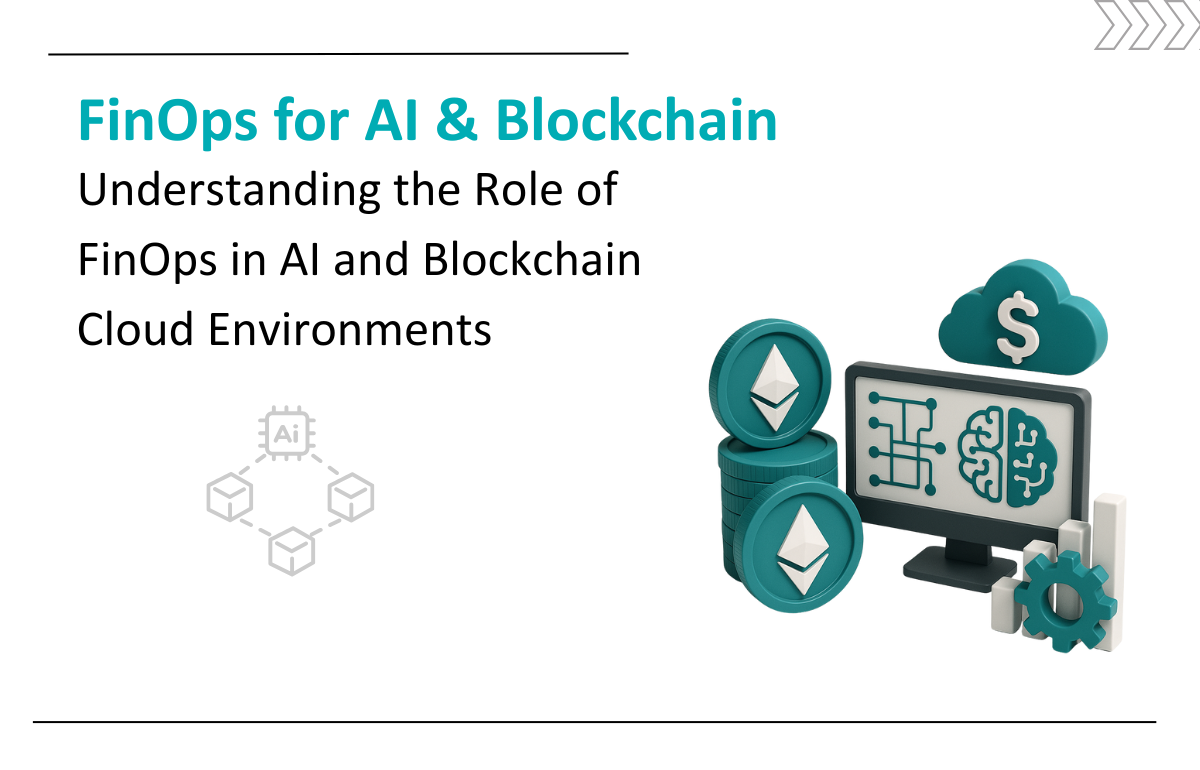
The rapid advancement of artificial intelligence and blockchain technology has made cloud infrastructure a critical base of innovation. In many ways, cloud technology serves to meet demands from the ability to train and use large machine learning models to the use of decentralized applications (dApps) at scale. When organizations adopt such heavy compute workloads, they increasingly rely upon cloud-managed services for scalability and flexibility. The cost of cloud-enabled services quickly becomes a concern because people can easily lose track of the consumption rate, leading to increased financial mismanagement.
This is where FinOps (Cloud Financial Operations) comes into play. FinOps, or financial operations, is a cultural and operational practice that integrates finance, engineering, and operations teams to help ensure cloud spend optimization and cloud cost management and cloud spend can be managed effectively without sacrificing performance. For AI and blockchain projects, FinOps is not just about saving money; rather, it is a strategic enabler of sustainable growth. Leveraging FinOps best practices ensures organizations can optimize costs while maintaining innovation and performance.
AI workloads in particular are highly variable and resource-intensive, making cost predictability a major challenge without proper cloud financial operations in place.
Both AI and blockchain workloads share one common challenge: unpredictability of costs. Training cycles may take longer than expected, or blockchain traffic may spike unexpectedly. Without proper financial governance and cloud cost management, these variables can quickly erode profit margins and hinder innovation.
1. Cost Visibility & Accountability
FinOps ensures teams have real-time visibility into cloud spending. By tagging resources by project, environment, or department, organizations can allocate AI training costs or blockchain node expenses accurately. This transparency prevents unexpected cost overruns and improves cloud cost management.
2. Rightsizing Compute Resources
3. Data Storage & Transfer Optimization
4. Automation & Policy-Driven Optimization
FinOps teams can deploy automated controls on costs in a variety of ways - for example, automatically turning off a development environment when it is not in use or implementing policy controls for the use of spot instances or reserved instances. Automation allows blockchain validators to consume resources only as needed, as well as the same for AI training pipelines, strengthening cloud spend optimization and AWS cloud cost optimization, and cloud cost reduction practices.
5. Leveraging Cloud Pricing Models
6. Collaboration Between Teams
FinOps encourages collaboration across finance, DevOps, and data science/AI engineers to balance cost with performance. For example:
Ultimately, this shared accountability ensures that technical innovation and financial sustainability grow together instead of working at odds. Leveraging FinOps best practices helps organizations embed this collaborative and disciplined approach.
When an organization embraces FinOps, it then has the chance to leverage cloud costs and potentially turn the ongoing organizational cost into a competitive advantage if they use FinOps best practices to make better-informed decisions, whether that is by training models at a lower cost, scaling blockchain networks at a lower cost, or planning for infrastructure improvement and expansion with future organizational-strategic growth considerations in mind.
When it comes to artificial intelligence (AI) or blockchain, "cost management" in the cloud encompasses not just cost reduction, but embedding sustainable growth, innovation, and efficiencies into your strategy. If you are leveraging FinOps, you are establishing the baseline and framework needed to develop financial accountability in the cloud, so you do not have to battle endless unpredictability tied to costs that drain your organization's resourcefully. Further, by embedding FinOps best practices in your organization, you will be able to enhance your approach to balancing performance, scalability, and cost visibility in keeping pace with the rapid complexity related to the evolving practices in AI and blockchain.
FinOps is not a cost reduction initiative; it is about enabling a culture of teams to be enabling to make better, smarter, financially accountable decisions in the cloud, including the strategic use of spot instances for flexible workloads and cloud spend optimization.
Seaflux Technologies is a custom software development company providing cloud computing solutions for AI, blockchain, and fintech projects. We help startups and enterprises implement FinOps practices and cloud cost optimization services for smarter resource use and predictable spending.
As an AI solutions provider, we deliver custom AI solutions for high-demand workloads. For blockchain, we offer custom blockchain solutions and act as a blockchain services provider. In fintech, we provide custom fintech solutions as a trusted fintech solutions provider.
Seaflux ensures your AI, blockchain, and fintech workloads run efficiently while keeping cloud costs under control.
Contact us today to optimize your cloud spend and unlock innovation.

Marketing Executive